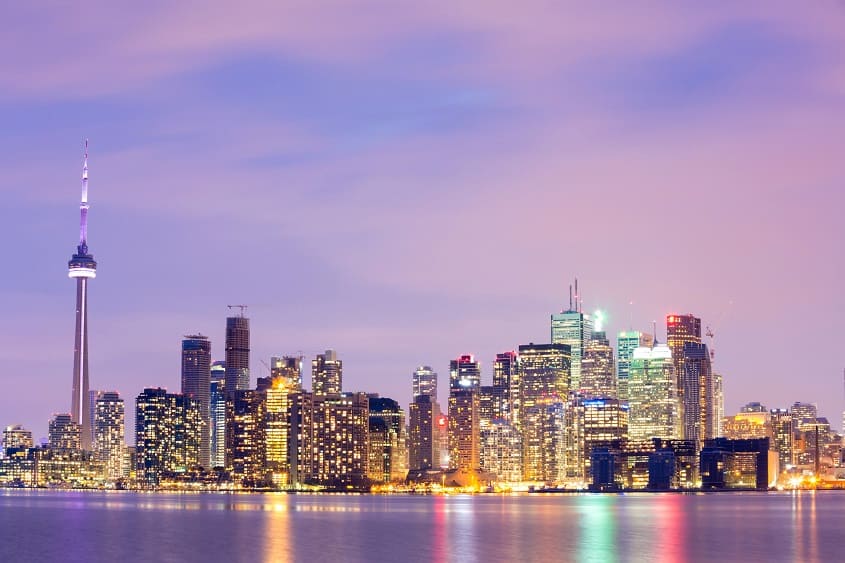Do you want to move to Toronto, Ontario? Exploring the vibrant life in Toronto? This guide provides invaluable resources to comprehend the essence of living in Toronto. From its diverse culture to the various lifestyle amenities here is everything you need to know before you move to Toronto.
Fact File Of Toronto
- Population in 2016: 2,731,571
- Average high temperatures in July: 27°C
- Average high temperatures in January: -1°C
- Number of rainy days (0.2mm or more) per year: 76
- Key industries: Finance, technology, film and television, healthcare
- Average residential property price (July – September 2021): $1,050,000
- Time zone: EST (UTC -5 hours)
- Official City of Toronto website: toronto.ca
Cost Of Living In Toronto
In Toronto, the cost of living varies depending on several factors. For a family of four, the estimated monthly costs are around $3,968.4 (equivalent to approximately 5,495.8 Canadian dollars) without considering rent. For a single person, the estimated monthly costs stand at approximately $1,097.0 (equivalent to around 1,519.2 Canadian dollars) without rent. Comparatively, Toronto is approximately 31.4% less expensive than New York City when considering costs excluding rent.
Job Market In Toronto
Toronto’s job market offers diverse opportunities across various industries. The city serves as a hub for finance, technology, healthcare, and creative sectors. The financial district hosts major banks and financial institutions, creating a significant demand for finance, accounting, and business professionals.
The thriving tech industry provides jobs in software development, IT, and innovation. Healthcare, a substantial sector, offers employment in hospitals and research institutions. Toronto’s vibrant creative scene, including film, television, and design, contributes to numerous job prospects. Moreover, the retail, education, and tourism sectors offer additional employment opportunities. The city’s diverse job market caters to a range of skill sets and qualifications.
READ ALSO: Living In Fort McMurray – Everything You Need To Know
Weather In Toronto
Toronto experiences a varied climate with distinct seasons. Spring, from March to May, transitions from chilly temperatures in March to milder weather in April and May, featuring occasional rain and blooming cherry blossoms. Summers, from June to August, are warm and humid, with July’s average high around 27°C (81°F), inviting outdoor activities and festivals. Autumn, September to November, brings cooler temperatures and vibrant fall foliage.
Winter, December to February, offers cold temperatures, averaging -1°C (30°F) in January, with snowfall and winter sports. Toronto receives an average of 33 inches of rain and 52 inches of snow yearly.
Neighborhoods In Toronto
1. The Annex
The Annex, situated near the University of Toronto, offers a vibrant and diverse atmosphere. Known for its historic Victorian homes, this neighborhood boasts an array of cultural venues, eclectic boutiques, and trendy restaurants. It’s a popular choice for students, professionals, and families due to its accessibility and rich cultural scene.
2. Distillery District
A historical and artsy enclave, the Distillery District captivates with its cobblestone streets, galleries, and artisanal shops. Once a former whiskey distillery, this area is now a hub for arts, entertainment, and upscale dining. Its preserved industrial architecture creates a unique setting for the thriving arts community.
3. Yonge and Eglinton
Yonge and Eglinton, a bustling intersection, offers a mix of modern condominiums and urban amenities. Referred to as “Yonge and Eligible,” this area is popular among young professionals and families due to its convenient transit access, a plethora of dining options, and entertainment venues.
4. High Park
High Park is a nature lover’s paradise, features the city’s largest green space. Known for its cherry blossoms, serene ponds, and hiking trails, this area attracts residents seeking a balance between urban living and nature. It offers a range of housing options, from apartments to picturesque homes.
5. Leslieville
Leslieville is a trendy east-end neighborhood, combines a laid-back vibe with a thriving culinary scene and boutique shops. Formerly an industrial area, it’s transformed into a sought-after residential community with a mix of historic homes and modern condos. Its welcoming community feel and proximity to the waterfront make it an attractive place for families and young professionals.
Schools and Education In Toronto
Elementary and Secondary Schools
The Toronto District School Board (TDSB) and the Toronto Catholic District School Board (TCDSB) oversee the majority of public elementary and secondary schools in the city. These institutions provide a comprehensive curriculum, extracurricular activities, and support services. Additionally, private and independent schools offer alternative educational approaches, such as Montessori or International Baccalaureate programs.
Post-Secondary Education
Toronto hosts several prestigious universities and colleges. The University of Toronto, known for its academic excellence, offers a wide range of undergraduate and graduate programs. York University, Ryerson University, and OCAD University are other well-regarded institutions in the city. Colleges like Seneca College, Humber College, and George Brown College provide vocational and applied learning programs in various fields.
Specialized Schools and Programs
Toronto is home to specialized schools focusing on the arts, sports, and STEM (Science, Technology, Engineering, and Mathematics). Schools like the Etobicoke School of the Arts, Rosedale Heights School of the Arts, and University of Toronto Schools offer specialized programs in arts and academics.
Education Initiatives
The city supports various educational initiatives, including programs for newcomers and ESL (English as a Second Language) learners. Additionally, Toronto Public Library branches offer resources, tutoring programs, and homework help for students.
Healthcare in Toronto
Toronto offers a robust healthcare system, providing residents with a comprehensive range of medical services and facilities. The city is home to several world-class hospitals, such as the University Health Network, Mount Sinai Hospital, Sunnybrook Health Sciences Centre, and SickKids Hospital, specializing in various medical fields including research, specialized treatments, and pediatric care.
The healthcare system includes both public and private healthcare services, with the publicly funded Ontario Health Insurance Plan (OHIP) covering essential medical services for residents. Additionally, numerous family doctors, specialists, clinics, and healthcare centers are spread across the city, ensuring accessibility to healthcare for the diverse population.
Transportation in Toronto
Toronto has a diverse transportation network, catering to the needs of its residents and visitors.
Public Transit
The Toronto Transit Commission (TTC) operates the city’s public transit system, including buses, streetcars, and subways. The subway system spans across key areas of the city, connecting various neighborhoods. Streetcars and buses provide additional coverage, offering comprehensive access to different parts of Toronto.
GO Transit
GO Transit, a regional transit service, operates trains and buses connecting Toronto to neighboring regions and cities. This service is especially useful for commuters traveling to and from the Greater Toronto Area.
Cycling and Walking
Toronto promotes cycling and walking, with dedicated bike lanes and walking paths across the city. Bike-sharing programs like Bike Share Toronto provide convenient access to bicycles for short trips within the urban core.
Ridesharing and Taxis
Ridesharing services and traditional taxis are readily available in Toronto, offering another mode of transportation for those preferring on-demand or point-to-point travel.
Road Network
Toronto has an extensive road network, but traffic congestion during peak hours is common. The Gardiner Expressway and Don Valley Parkway are major arteries connecting the city and facilitate transportation within Toronto and to the surrounding areas.
Accessibility
Efforts have been made to improve accessibility, with most public transit services accommodating individuals with disabilities. Subways and buses are equipped with features for easy access, and accessible taxis are available.
Restaurant And Dining Life
Ethnic Cuisine
The city celebrates its multiculturalism through a wide range of ethnic restaurants, serving authentic dishes from around the world. From Indian to Thai, Italian to Middle Eastern, and everything in between, Toronto’s neighborhoods host a rich tapestry of global flavors.
Fine Dining
For those seeking upscale dining experiences, Toronto offers a plethora of fine dining restaurants. These establishments provide gourmet meals prepared by renowned chefs, often accompanied by sophisticated ambiances and exceptional service.
Casual Eateries
From cozy cafés to bustling diners, Toronto is filled with charming spots offering a more relaxed atmosphere. Visitors can enjoy casual bites, specialty coffees, and homemade pastries while soaking in the city’s vibrant energy.
Food Markets and Food Trucks
Food markets like St. Lawrence Market and Kensington Market offer fresh produce, specialty foods, and an array of culinary delights. Additionally, food trucks and pop-up food events add an element of creativity and variety to the dining scene, showcasing innovative and diverse cuisines.
Local and Seasonal
Many restaurants in Toronto emphasize locally sourced and seasonal ingredients, contributing to sustainable dining practices and fostering a farm-to-table approach.
Conclusion
Considering a move to Toronto, Ontario? This comprehensive guide sheds light on the essential aspects of life in this vibrant city. Toronto, a bustling metropolis of over 2.7 million, offers a diverse job market across industries like finance, technology, healthcare, and the arts, reflecting its dynamic economy.
The climate, varied neighborhoods, and educational opportunities enhance its appeal. Moreover, the city’s robust healthcare system, inclusive public transit, and rich dining culture underscore the quality of life Toronto offers.
With its unique neighborhoods, diverse cultures, and a plethora of opportunities, Toronto stands as an inviting destination for individuals and families seeking a blend of urban vitality and community-centric living. This guide serves as a comprehensive resource, illuminating the varied facets of Toronto life for those considering making this vibrant city their home.

